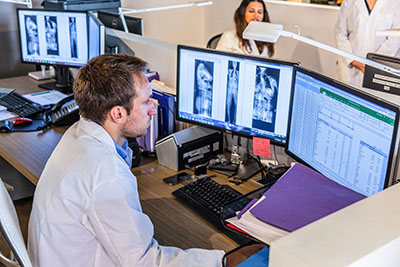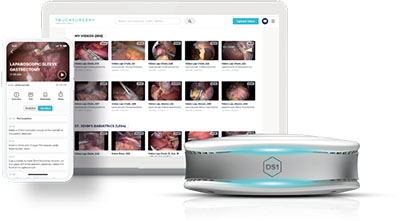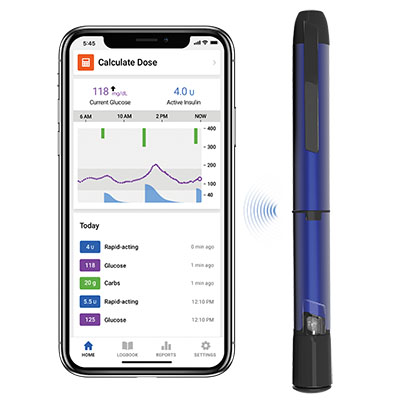Get Smart
How three acquisitions will help Medtronic expand its artificial intelligence and data capabilities
Taking multiple daily injections of insulin can sometimes be like remembering where you’ve put your car keys. It’s easy to forget what you’ve done, especially when it comes to daily, repetitive actions.
But with Companion Medical’s InPen™ — the only smart insulin pen with an integrated diabetes app cleared by the FDA — it’s easy to remember how much insulin you’ve taken. Just look at the app, which automatically records the time and date of every insulin dose.
Medtronic recently acquired Companion Medical, a move that expands the company’s lineup of devices that use “smart” technology to deliver better patient care. Announced last week, a new integrated system combines InPen™ with the Guardian Connect™ continuous glucose monitor (CGM), providing real-time glucose readings alongside insulin dose information for patients who rely on multiple daily injections.
And announced today, Medtronic has closed on its acquisition of Medicrea, a French company widely regarded as pioneering the transformation of spinal surgery through artificial intelligence (AI) and predictive modeling.

These strategic pick-ups, along with the recent acquisition of Digital Surgery, illustrate how Medtronic is making moves to push smart medical devices and technologies to the forefront of healthcare.
Smart devices allow providers to tap into enormous amounts of data, and can help improve the health of patients with chronic and expensive health conditions like diabetes. But sifting through that data is no small feat. AI, machine learning, and predictive modeling are often the engines that drive that important work. As healthcare systems grapple with how to provide quality care in the most efficient, cost-effective way, both AI and machine learning are playing increasingly important roles in making that a possibility.
“We’re committed to leveraging data and insights in everything we do and delivering on a whole new vector of innovation with digital technologies,” said Geoff Martha, chief executive officer at Medtronic. “When it comes to data, the amount of information we generate from our devices today is massive and is only increasing. From predictive analytics to artificial intelligence and machine learning, there is huge opportunity to harness the power of these and other technologies that are redefining the tech world to enhance the relevance and value of our products.”
Harnessing the power of AI in the OR
Mark Palmer, a distinguished scientist at Medtronic, said Medicrea and Digital Surgery are exciting pick-ups because they offer surgeons simulation and video analytics that, combined with Medtronic devices, could open new frontiers in surgery.
“Medtronic has a long history of putting these awesome implantable devices in the hands of clinicians,” he said. “In the past, much of our AI work was only on the device side of the equation. With these acquisitions, we are accelerating the capability to implant AI-capable devices using AI-guided procedures.”
Digital Surgery makes that exciting future possible. And it’s already advancing surgery today.

The Touch Surgery™ surgical simulation app takes surgical training to the next level and is emerging as an invaluable tool as hospitals work to adapt during the global pandemic. Touch Surgery™ Enterprise — which brings AI to the OR for the first time — records, stores, and analyzes surgical video. Empowering clinicians with data that can reduce variability and improve surgical performance.
“While Digital Surgery technology is pioneering in its own right and creating new opportunities to drive value for customers, we’re really excited to pair it with our soft-tissue robotic-assisted surgery solution,” said Megan Rosengarten, president of Surgical Robotics at Medtronic.
“The combination of robotics and data and analytics opens a world of opportunity to further advance surgery,” Rosengarten said. “Ultimately, we believe it will expand access to quality care for more patients around the world.”
Putting the power of AI in diabetes management
The addition of Companion Medical’s InPen™ to the Medtronic portfolio expands the company’s ability to serve people living with diabetes.

Sean Salmon, executive vice president and president of the diabetes business at Medtronic, said the acquisition is ideal, as the company seeks to simplify diabetes management by optimizing dosing decisions for the large number of people who need multiple daily injections (MDI).
“We look forward to building on the success of the InPen™ by combining it with our intelligent algorithms to deliver proactive dosing advice personalized to each individual,” Salmon said. “Combined, this smart continuous glucose monitoring system can help people think less about diabetes and be able to live life with more freedom, on their own terms.”
The acquisition of Companion Medical builds upon prior Medtronic strategic acquisitions, including Nutrino and Klue that form the building blocks to design powerful algorithms leveraging the company’s data science and AI capabilities.
In some ways, it’s easier to deploy AI technology in conjunction with medical devices used in the treatment of diabetes because most are worn on a person’s body, Palmer explained. That makes it easier for devices to collect and interpret data in real-time.
“With some of our technical capabilities, we’re really moving beyond looking at the devices,” Palmer said. “We’re thinking more holistically about how we can help people manage their health so they can focus less on their disease and more on living their lives.”
Technologies we can grow
With each of the acquisitions, Medtronic plans to exert its size and resources to bring some of these exciting devices and technologies to broader global markets.
Martha says this is one way the company can “play big” on the world stage.
“We don’t buy growth, we grow what we buy,” said Martha. “We’re prioritizing strategic investments in innovation where we see the best opportunities for growth over the near and long term ― a key win for our company, our customers, and the patients we serve.”
L001-11122020
